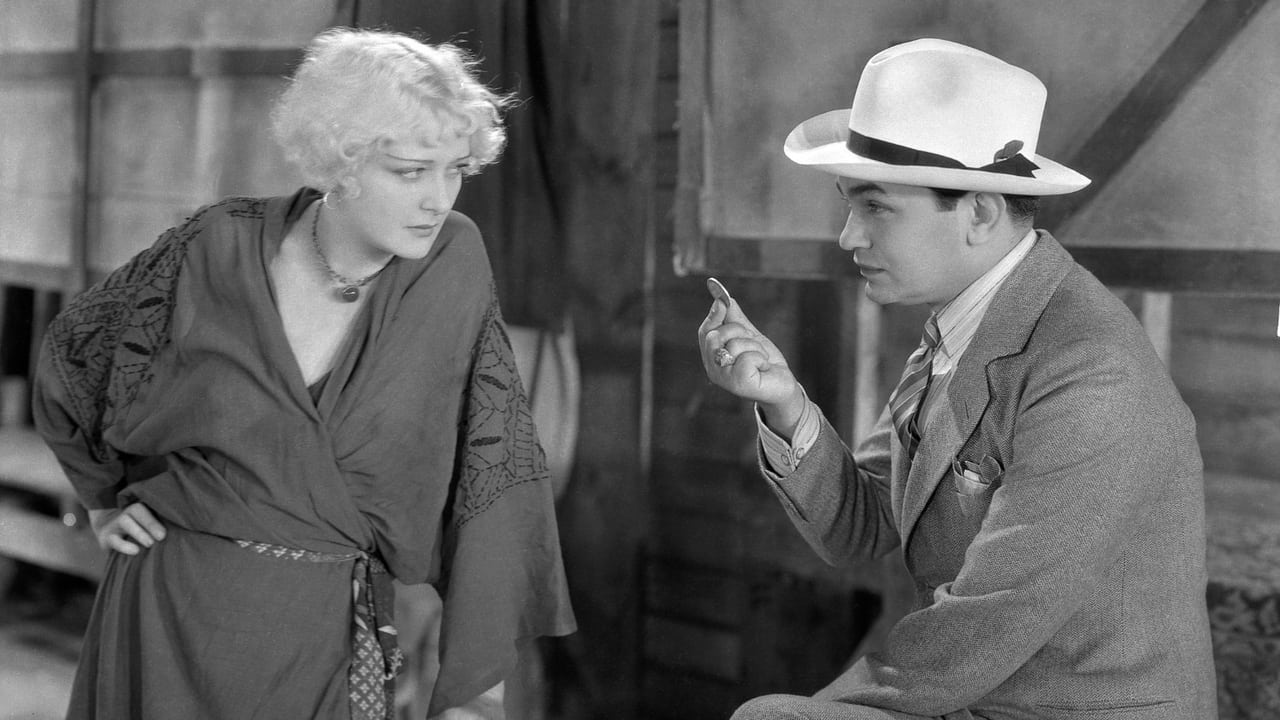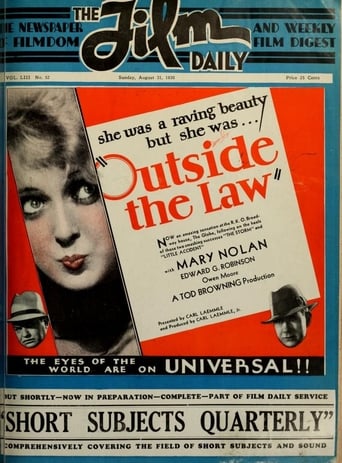

Slow pace in the most part of the movie.
... View MoreSelf-important, over-dramatic, uninspired.
... View Morean ambitious but ultimately ineffective debut endeavor.
... View MoreA story that's too fascinating to pass by...
... View MoreThe first outing for this movie was in 1920 - it was a Universal Jewel which meant it was a top production for it's star player Priscilla Dean, a very up and coming player in Lon Chaney and their top director Tod Browning who, like Frank Capra later on at Columbia, his innovative movies were putting Universal on the map. Fast forward ten years and with talkies Browning was losing his magic touch. I so wanted to like this movie but by this time Mary Nolan's severe personal problems were fast eroding Universal's confidence in her, what with the lurid headlines and the on set diva behaviour. I always felt Nolan had a lot of acting talent but it was obvious she needed a director who was going to channel her emotions - something that Browning, in 1930, was unable to do. Bringing up all her emotions for the tough girl part of Connie's personality, she had no believability when the vulnerability had to surface at the end. Watching, you realise what a terrific actress Priscilla Dean had been. The earlier movie had featured Lon Chaney as Cobra and his appearances were superb but now the spot light was on Edward G. Robinson (even though Nolan's name preceded his in the credits) and because he was still finding his movie feet, the part became conventional. Only Owen Moore bought naturalism to his part as "Fingers", the crook with a conscience. Robinson plays Cobra who is double crossed in a bank hold up - his two partners "Fingers" and "Connie" disappear with the cash. The problem with the movie then is that Robinson drops out of sight as the plot concentrates on the other two who hide out in an apartment. "Fingers" then finds himself under the spell of a little boy who lives in an adjoining apartment little realising that his father is the local policeman!! Mary Nolan's emotions were given no reign, there was even an horribly racist scene where she and Robinson were getting pretty cosy and then his mother enters and she realises Cobra has Oriental blood - her highly emotive acting (as well as dowsing herself with water so she won't be contaminated) is pretty terrible to watch. But just when you think it is all about Mary, "Fingers" does a character change from a wanting to go straight and settle down type of guy to "let's take the money and run"!! It's all a bit much and Browning handles the climax far less smoothly than he did in the original. The original featured an exciting gun battle between the three protagonists but in this one, probably because of the restrictions of the microphone - Cobra comes to the flat, is knocked unconscious by "Fingers" who then spends the rest of the film trying to save the life of the little boy's father!!This movie would have greatly benefited by giving Robinson a more prominent part!!
... View MoreThis movie has director Tod Browning remake one of the Priscilla Dean underworld thrillers he had directed before he had hooked up with Lon Chaney. In fact, the earlier version had Chaney as one of the principal roles. In this version, bank robber Owen Moore works with gorgeous moll Mary Nolan to cheat underworld boss Edward G. Robinson out of what he considers his rightful cut of any crime committed in San Francisco. Like many a Browning picture, people are insane, particularly Miss Nolan.The problem with this movie, like many she appeared in, is that star Mary Nolan's acting... well, she has improved from some of her earlier works. As one of Browning's insane characters, I find her senseless mood changes and talking to herself convincing; it's when she interacts with other people that I find her unbelievable.Everyone gets to be weird, even Rockcliffe Fellowes as the police captain trying to track down the bank robbers, and whose annoying son, played by one of the innumerable Watson clan, breaks into their hide-out, since they all live in the same building.It's clear that Miss Nolan is the star of this movie - she gets more tics and twitches than anyone else, although Robinson shines in the sort of gangster role he would play at Warner Brothers. It's Miss Nolan's movie to carry, and she does a poor job of it, although Browning's usual insane world filled with mad people certainly kept my interest up.
... View More1930's "Outside the Law" was the first of director Tod Browning's three Universal pictures, to be followed by the immortal "Dracula" and "Iron Man" (both 1931). Leaving MGM after his first talkie, 1929's "The Thirteenth Chair," Browning debuted at Universal with this remake of his own 1921 silent crime drama, also titled "Outside the Law," one of his first collaborations with the late Lon Chaney. Second billed Edward G. Robinson easily dominates as gang leader Cobra Collins, who demands a piece of the cut when the local bank is robbed by a small time crook (Owen Moore) and his moll (Mary Nolan). What truly sinks it are the endless scenes depicting the two crooks alone in their apartment, coddling a nauseating little boy who just happens to have a police captain for a father. It's rather dispiriting to think that a director like Tod Browning, with a real feel for the macabre, would display such a heavy hand with such maudlin sentimentality, yet the glacial pace is a reminder of how he botched "Dracula." The unsympathetic bickering of the two insufferable leads clearly has the opposite effect of what was intended (their unspectacular careers quickly petered out, with Moore dead by 1939, and Nolan by 1948). Browning's next feature would leave this old fashioned claptrap in the dust: the 1931 "Dracula" (his triumphant return to MGM produced the shocking "Freaks" in 1932). Already typecast as underworld kingpins, Edward G. Robinson would follow this forgettable fluff with "The Widow from Chicago," leading to the vastly superior and uncompromising gangster classic "Little Caesar," released early in 1931, and then a pair of intriguing titles opposite Boris Karloff, "Smart Money" (co-starring James Cagney) and "Five Star Final."
... View MoreAround 1979 or so I was in MOMA and decided to look at the film collection. They had two movies that day that I saw. One was a silent film entitled THE FIELD OF HONOR starring Allan Holubar, a prominent early actor/director/producer. That was a silent film set in the Civil War. Then there was this movie. It was not a great film, but I was curious to see it because Robinson was in it. It is not one of Robinson's best films so it is rarely revived (I don't even think it has been shown on TCM or AMC or Channel 13. The interesting thing is that Owen Moore is the hero and Mary Nolan the heroine. They are "good criminals" as opposed to Robinson who is a violent boss - thug. This was made before the full effect of the movie code, the "Hays Office", the Catholic Legion of Decency, etc. was felt, so that at the end despite the arrest of Moore and Nolan (Robinson gets bumped off), you feel the jury is going to be easy on them - however, the final verdict is not heard by the movie audience. Aside from Robinson, only Louise Beavers (a few years before her great performance in the original IMITATION OF LIFE) and Rockliffe Fellows are recalled - Fellows because he played the criminal Alky Briggs, who engineers the kidnapping of Zeppo's girlfriend in the Marx Brothers film MONKEY BUSINESS. Nolan has a choice moment (again, before the full effect of movie code censorship occurred) when she is forcibly grabbed by the slimy Robinson, and she rubs the spot with her hand as though she is using the world's heaviest piece of steel wool on the spot. Robinson is enjoying the moment. It is like a companion to his moment in the more memorable KEY LARGO when he is seen whispering something sordid to Lauren Bacall. We never hear it, but his facial look is so disgustingly suggestive we love watching her haul off and slap his face at the end of the moment. In that case, though, Robinson did not like the result of the moment.
... View More